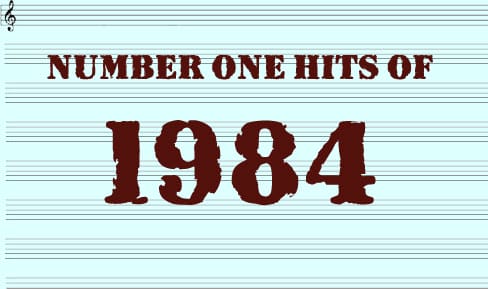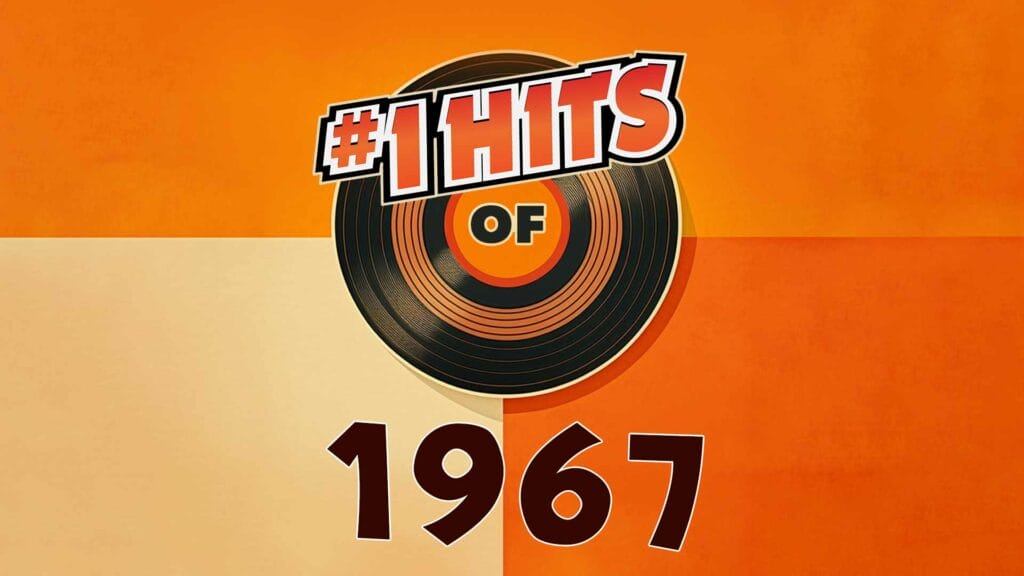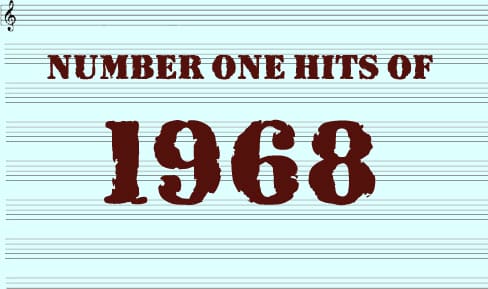 |
||||
|---|---|---|---|---|
The Number One Hits Of 1984 |
||||
| December 10, 1983 – January 20, 1984 Paul McCartney and Michael Jackson Say, Say, Say Say, Say, Say is a collaboration between Paul McCartney and Michael Jackson, released in 1983 as the lead single from McCartney’s album “Pipes of Peace.” McCartney and Jackson co-wrote the song. In the music video, McCartney and Jackson play the roles of “Mac and Jack”, two traveling con-men selling a “miracle potion.” It was recorded during sessions for McCartney’s “Tug of War” album, simultaneously with their other collaboration; The Girl Is Mine for Jackson’s “Thriller.” |
||||
| January 21, 1984 – February 3, 1984 Yes Owner of a Lonely Heart Yes is an English progressive rock band formed in 1968, known for their elaborate arrangements and philosophical lyrics Owner of a Lonely Heart is considered a departure from their typical sound, featuring a more accessible, radio-friendly style |
||||
| February 4, 1984 – February 24, 1984 Culture Club Karma Chameleon Karma Chameleon refers to the Buddhist concept of karma, which asserts that every action has consequences, and the word chameleon, symbolizes the ability to adapt or change. It was the biggest-selling single of 1983 in the UK and is Culture Club’s biggest hit. The song’s lyrics are about the complexities of love and relationships and the importance of honesty and communication. The music video for “Karma Chameleon” was set in the 1870s and filmed at Desborough Island in Weybridge, Surrey, England. It features Boy George as a colorful character in a crowd of people in period costumes, and it won the 1984 Brit Award for Best British Video. |
||||
| February 25, 1984 – March 30, 1984 Van Halen Jump Eddie Van Halen played the synthesizer part on an Oberheim OB-Xa, and started years before the song was completed. He had to wait until the band was ready to embrace a more pop-oriented sound. Despite its popularity, “Jump” is the only Van Halen song to have reached number one on the Billboard Hot 100 chart. |
||||
| March 31, 1984 – April 20, 1984 Kenny Loggins Footloose Footloose was co-written by Kenny Loggins and Dean Pitchford, who also wrote the screenplay for the “Footloose” movie. Loggins was already known for creating popular movie soundtrack songs, earning him the nickname “King of the Movie Soundtrack.” He had previously written hits for movies like “Caddyshack” and “Top Gun.” |
||||
| April 21, 1984 – May 11, 1984 Phil Collins Against All Odds (Take a Look at Me Now) After the filmmakers heard his hit In the Air Tonight, Phil Collins was approached to write a song for the movie and liked the dark, atmospheric mood it conveyed. The song was based on an earlier composition by Collins titled How Can You Sit There? which was written during the sessions for his debut solo album, “Face Value.” He resurrected the tune for Against All Odds. The song’s original demo was performed with just Collins on the piano. The final version used in the film and on the soundtrack included full orchestration. It became Collins’ first single to hit No. 1 on the Billboard Hot 100 chart in the United States and reached the top of the charts in several other countries. |
||||
| May 12, 1984 – May 25, 1984 Lionel Richie Hello Lionel has stated that he was inspired to write Hello after his time with The Commodores. He had written a piece of a love song that started with the word “Hello,” and it stuck with him for years until it finally became the full song. Lionel Richie performed Hello at the 1984 Grammy Awards, where his “Can’t Slow Down” won Album of the Year. Despite the song’s romantic lyrics, Richie has mentioned in interviews that “Hello” was not written about anyone in particular. |
||||
| May 26, 1984 – June 8, 1984 Deniece Williams Let’s Hear It for the Boy Despite the song’s popularity, Deniece Williams initially didn’t want to record it as she thought it was too pop-oriented and might alienate her R&B fan base. Interestingly, while Let’s Hear It for the Boy was Williams’s biggest pop hit, she continued to have a successful career on the R&B charts, where she had twelve No. 1 hits. |
||||
| June 9, 1984 – June 22, 1984 Cyndi Lauper Time After Time Cyndi Lauper and Rob Hyman of The Hooters co-wrote the song. Lauper and Hyman wrote the song in the middle of the night at a session in a small studio in New Jersey. The phrase “time after time” from the song’s chorus was inspired by a 1979 science fiction movie of the same name. The song was inducted into the Grammy Hall of Fame in 2016. |
||||
| June 23, 1984 – July 6, 1984 Duran Duran The Reflex The Reflex was released in 1984 and became one of the band’s biggest hits. It is the band’s most successful single, reaching number one in the UK and the United States. The version of “The Reflex” that became a hit was a remix by Nile Rodgers, a prominent producer, and musician who was a founding member of the band Chic. Rodgers’ version notably differed from the original album version, featuring a more dance-oriented sound. The song’s lyrics are famously cryptic, with lines like “The reflex is a lonely child who’s waiting by the park.” According to band members, the lyrics didn’t have a specific meaning and were more about creating a mood than telling a story. The song’s music video, directed by Russell Mulcahy, was shot in front of a live audience and featured innovative visual effects for the time. It won the Grand Prix at the International Video Music Awards in 1984. |
||||
| July 7, 1984 – August 10, 1984 Prince When Doves Cry When Doves Cry is a pop song without a bass line, which is very unusual, Prince reportedly removed it because he felt it was “too conventional”. The song was Prince’s first Billboard Hot 100 number-one single, staying there for five weeks, and was also a worldwide hit. In 2016, following Prince’s death, When Doves Cry re-charted on the Billboard Hot 100, reaching number eight, making it the first song to reach the top 10 in three different decades. |
||||
| August 11, 1984 – August 30, 1984 Ray Parker, Jr. Ghostbusters Written in just a few days, there was some controversy around the song. Huey Lewis sued Ray Parker Jr., claiming that Ghostbusters was too similar to his song I Want a New Drug. The lawsuit was settled out of court, although Ray maintained songwriting credit. Ghostbusters marked a peak in Ray Parker Jr.’s career. Despite having a successful career both as a solo artist and as a member of the band Raydio, he is often labeled a one-hit wonder because of the song’s overwhelming success. |
||||
| September 1, 1984 – September 21, 1984 Tina Turner What’s Love Got to Do with It Initially, Tina herself was not keen on the song. She thought it was not edgy enough and did not align with the rock sound she aimed for at that time. What’s Love Got to Do with It became a massive hit, reaching number one on the Billboard Hot 100 chart in the United States. It was Turner’s first and only solo number-one single in the U.S. The song won three Grammy Awards in 1985, including Record of the Year, Song of the Year, and Best Female Pop Vocal Performance, marking a significant recognition of Turner’s comeback. |
||||
| September 22, 1984 – September 28, 1984 John Waite Missing You John Waite wrote “Missing You” with Charles Sandford and Mark Leonard. This song was about his loneliness and longing after his breakup with his girlfriend. Mr. Waite had mentioned in interviews that he didn’t think it was finished when he was recording the song. He thought the chorus was too simple and the song needed more complexity. However, the producer insisted that it was perfect the way it was. The song’s refrain, “I ain’t missing you at all,” is often interpreted as a denial of the feelings expressed in the rest of the song – the speaker is trying to convince himself that he’s not missing the person, even though he is. #denial |
||||
|
September 29, 1984 – October 12, 1984 Also, Let’s Go Crazy was one of the first songs to get a parental advisory sticker due to its use of the word “God” in a non-religious context, highlighting the cultural debates of the era. |
||||
| October 13, 1984 – November 2, 1984 Stevie Wonder I Just Called to Say I Love You The song was written, produced, and performed by Stevie Wonder. Not only did he sing the lyrics, but he also played every instrument heard in the track. The song is a tribute to Stevie’s mother, Lula Mae Hardaway. I Just Called to Say I Love You was featured in the 1984 comedy “The Woman in Red.” It won the Academy Award for Best Original Song in 1985. It was Stevie Wonder’s first Oscar win. The song is notable for lacking a bridge section, a common feature in pop songwriting. Instead, it sticks to the verse and chorus structure, with a synthesizer solo serving as a kind of break in the middle. |
||||
| November 3, 1984 – November 16, 1984 Billy Ocean Caribbean Queen (No More Love on the Run) Caribbean Queen (No More Love on the Run) was released under different titles for different markets. In the UK, it was “European Queen,” and in some parts of the world, it was “African Queen.” The verses and chorus remained the same, but the titular lyrics were changed, a unique approach that helped the song gain global appeal. The song won Billy Ocean a Grammy Award in 1985 for Best Male R&B Vocal Performance, marking one of the peak moments of his career. |
||||
| November 17, 1984 – December 7, 1984 Wham! Wake Me Up Before You Go-Go The inspiration for the song came from a note that Andrew Ridgeley, the other half of Wham!, had left for his parents. He wrote, “wake me up up before you go go”, accidentally writing “up” twice. George Michael found it amusing and decided to turn it into a song. The music video for Wake Me Up Before You Go-Go is notable for its use of “Choose Life” t-shirts, which became a popular fashion trend in the 80s. This phrase was not related to the pro-life movement but was a positive message promoted by the designer Katherine Hamnett. |
||||
| December 8, 1984 – December 21, 1984 Daryl Hall and John Oates Out of Touch Out of Touch was one of the biggest hits of 1984, and it was the duo’s last Billboard Hot 100 number-one single. The song’s concept came from a phrase John Oates had written in his notebooks. It referred to how they felt about pop music at the time, feeling “out of touch” with current trends. |
||||
| December 22, 1984 – February 1, 1985 Madonna Like a Virgin Madonna’s iconic performance of Like a Virgin at the first MTV Video Music Awards in 1984, where she appeared atop a giant wedding cake and then rolled around on the stage floor, became one of the most memorable moments in the history of the awards show. The song was produced by Nile Rodgers, famous for his work with Chic and David Bowie. Madonna herself was not the first choice for the song. Rodgers had originally considered other singers but eventually decided that Madonna would bring a unique interpretation to the track. |
||||
|
The Biggest Pop Artists of 1984 include: (HPS music data is compiled from charts, including Billboard’s Pop, Rock, Airplay, R&B/Dance, and Singles Charts. The Hot 100 is the primary chart used for this list.) |
||||


